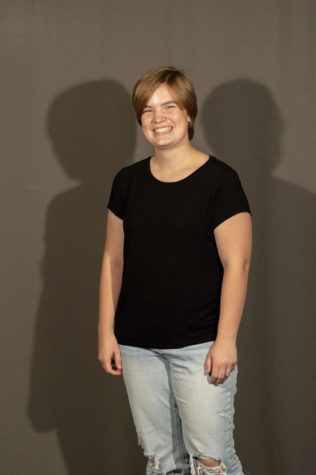Writing her own story

A hand print of the Venezuelan flag.
December 20, 2018
“The reason I talk about diversity is because I know what it’s like,” senior Oriana Fuenmayor said.
Oriana Fuenmayor is a modern-day immigrant, whose family had to flee from their home country of Venezuela, where the economic crisis has escalated to the point where 2.3 million people have fled in order to survive. Fuenmayor has used this life-altering situation to propel her forwards in life, particularly through her advocacy for equality.
“Within the school there are so many things that I wouldn’t know about myself now if it wasn’t for the fact that I moved here. Poetry, art, and pretty much my advocacy for diversity and social issues and justice, are all things I discovered being here,” Fuenmayor said.
From the beginning of her time here, Fuenmayor found out that living in the U.S. was not going to be easy. Education, which many don’t even give a second thought to, was a particularly sticky situation when Fuenmayor first arrived in Florida in the September of 2016.
“When I went to enroll in a public school, they looked at my passport and they said, ‘You can’t study here because you’re not a citizen.’ So I went to a different school to try and get enrolled and register and I went from school to school,” Fuenmayor said. “[The supervisor of student records for the county] called me and my parents to the office and he looked me dead in the eye, and he said, ‘If you want to come to an American school, you have to go back to your country and pay whatever money you have to pay for a student visa. But otherwise, you’re not going to go to school here.’”
Through word of mouth, Fuenmayor and her family found out about a small military school where they were able to enroll Fuenmayor. This new arrangement, however brief, would eventually become the driving factor for the Fuenmayors to move to Noblesville.
“The county had emailed the principal a photocopy of my passport, saying that according to the law, I was not allowed to go to school here,” Fuenmayor said.
That December, Fuenmayor enrolled in Noblesville High School, where in turn she was also enrolled into the English as a New Language program. Here she met Krysten Plahm, the coordinator of the program who helped Fuenmayor integrate into life at NHS.
“She is like a sponge. She wants to know everything and anything that has to do with vocabulary and words and American culture,” Plahm said. “Her junior year, she was in Miss Zilligen’s AP class. After that school year, I did the language test again on her. She got the highest score you can get and exited my program. It was phenomenal. And now she’s taking all AP courses this year doesn’t need any help with language.”
This past summer, the opportunity was presented to Fuenmayor, who had previously spoken at community meetings and presentations, to be able to be one of three local speakers from Indiana to speak on race and diversity through an organization called Q Commons. The event broadcast the speech of three national speakers, and local speakers from each state also had their speeches available for viewing by people across the nation.
“I was asked to give my perspective as an immigrant, like, ‘What does an American immigrant look like today?’ The idea was I could teach people how they could be more empathetic and how to be more welcoming towards the immigrant population,” Fuenmayor said.
Fuenmayor believes that the key for larger strides towards equality is through learning how to be empathetic.
“Empathy is listening to somebody— to their experiences— and even though you may not have lived that before, you’re trying to understand that. So you’re being understanding, you’re being comprehensive, and you’re using that opportunity of listening to listen to someone that is different than you to enrich yourself as a person and to broaden your horizons,” Fuenmayor said.
The week that an NHS student wrote racial slurs on a bathroom stall was also, coincidentally, the week that the NHS Student Ambassadors had their first meeting. The purpose of the group is to promote empathy and begin conversations on how to best listen to each other.
“I feel like it’s not about focusing on race, because race is just [what] it is, and there’s a reason that we don’t say promote diversity. You can’t promote diversity, you can’t force more people of color to Noblesville,” Fuenmayor said. “You can’t go around the world and get people to move here. What you can do is prepare people for the way that they’re gonna treat different people.”
That following Monday, Scott Martin, a professional speaker, came in to talk to the student body of NHS about what had happened that previous Friday. For many students, this was not well-received by some. For Fuenmayor, however, she can sympathize.
“It is not an easy job, and so I think he did his best. What is happening at school, it takes more than just a talk,” Fuenmayor said. “The school staff is the one that has to take the first step. Because if we don’t have teachers who promote empathy themselves and who show their indignation towards intolerance, then no student is going to believe the school when it says that the goal is to prevent any more racism.”
The attention must be given to the right people for progress in a situation such as this, since it’s so broad, to actually happen.
“The problem with the way that we are trying to come up with a solution [to racism and inequality] is that we’re giving microphones to people who do not have a voice on this topic,” Fuenmayor said. “You have to give chances to those who have experienced the problem themselves to be able to teach other how to solve it.”
Often people of color are speaking out less in situations when they find themselves in a white majority population. Just as teachers have to be extremely knowledgeable about what they teach, is not so different of a situation for Fuenmayor. Those who speak out about matters of equality also have to know their subject like the palm of their hand.
“If you bring people who have not had those experiences, those people who are in the group [who are] privileged— who have never been victims of racism or of discrimination— even sexism— if you bring people who don’t know what it’s like to be trapped behind those barriers, those people cannot teach others what it’s like,” Fuenmayor said.
Besides her work in advocacy through speeches and teaching, Fuenmayor also exhibits her passion through poetry and photography.
“Photography is more about exploration for me, but for poetry it is about channeling all the things that I feel, because I feel a lot. I’m a very emotional person,” Fuenmayor said.
Her expression through writing began at a very young age and stuck. Back in Venezuela, Fuenmayor would write with her best friend. Here, writing has become an opportunity for her to get her point across in English.
“The reason that I write poetry and not just prose is because writing itself is very hard for me since, you know, English is not my native language, so it’s a lot of thinking for me,” Fuenmayor said. “But poetry, being the most condensed, [is] the most synthesised form of writing [and] works perfect for me. Because I get to say more with fewer words.”
Bill Kenley, Fuenmayor’s Creative Writing teacher from last year, has clearly seen Fuenmayor’s development in her writing.
“Oriana has survived Venezuela and Chavez and she’s come up here and gone through that whole thing. So she’s had an experience that was incredibly challenging, and because of that, she’s got an interesting story to tell,” Kenley said. “I think her writing has improved a ton, but I think the main thing is she thinks of herself as a writer now.”
Photography has served a similar purpose for Fuenmayor, but in a very different manner.
“For photography, I take these pictures and I combine them in ways that I don’t even expect it to look like that. I have a basic idea in mind, but I don’t exactly know what it’s gonna look like, and I don’t know how people are going to interpret it,” Fuenmayor said.
Though Fuenmayor hasn’t been back to her home country since leaving in 2016, it’s still on her mind and in her heart.
“I definitely do [want to go back] because it’s my home, and I feel like it doesn’t matter how many years go by, I still feel attached to the people there. Pretty much all of my family is over there,” Fuenmayor said. “ I don’t want to go back just because I miss it, but because one of my aspirations, let’s say my dreams, is being able to gather all the things that I’ve learned here to improve what is going on there.”
At the heart of it all still lies empathy, which when utilized in the correct way, can help one accomplish great things.
“I’ve seen all this racism, and I’ve experienced it myself, all this racism, this discrimination, and all of those things happening here. It’s made me realize that my own experiences can help me fight against that,” Fuenmayor said. “Race and color and accents, because it’s also about language, it’s about culture, those things should not make you make assumptions but to ask questions.”



